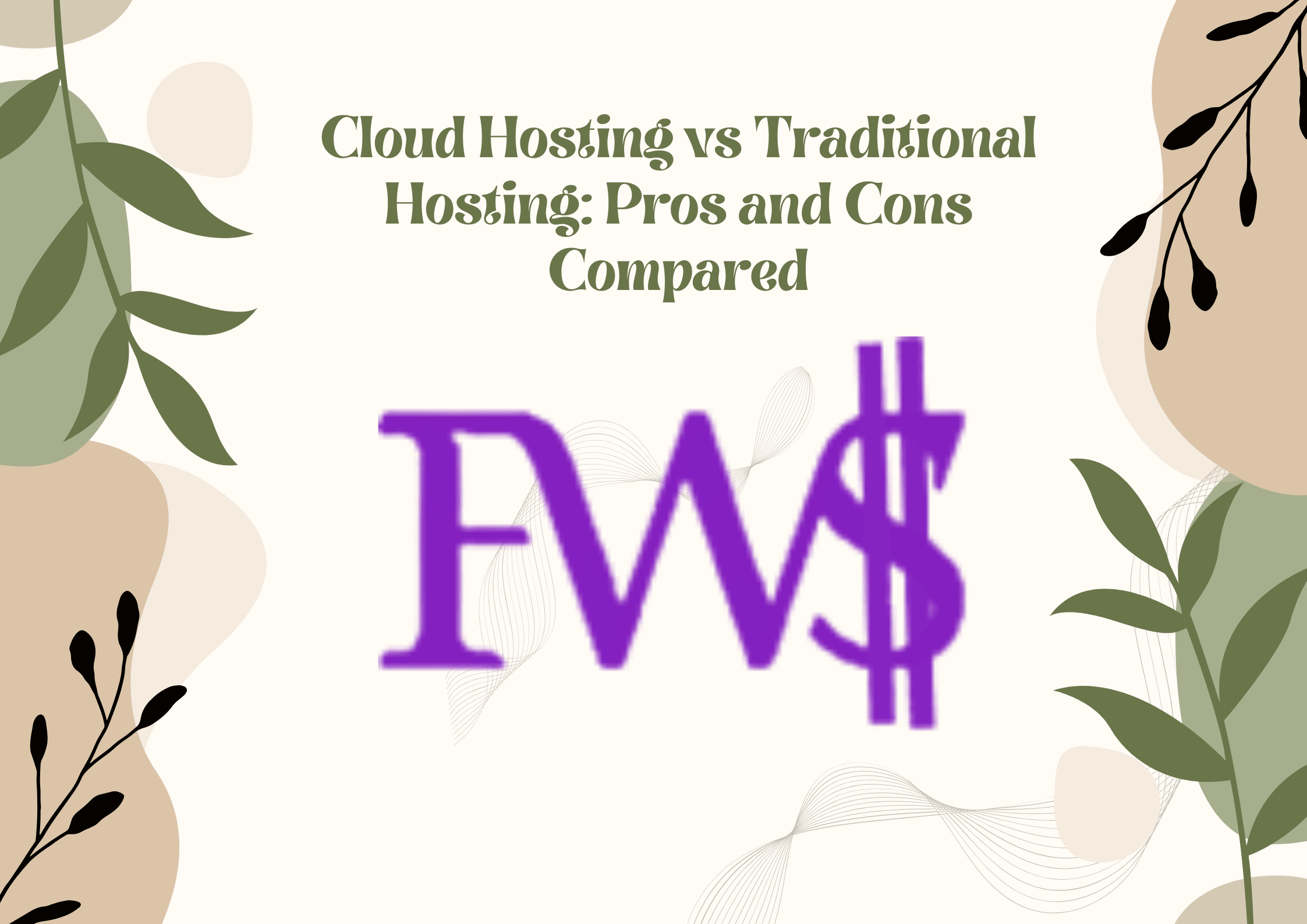Cloud Hosting vs Traditional Hosting - Pros and Cons Compared

Cloud Hosting vs Traditional Hosting: Pros and Cons Compared
Choosing the right web hosting solution is crucial for your website's performance, security, and scalability. The debate between cloud hosting vs traditional hosting continues as businesses look for the most efficient and cost-effective solution. In this article, we will compare both hosting types, highlight their advantages and disadvantages, and provide a free hosting comparison to help you make an informed decision.
What is Cloud Hosting?
Cloud hosting is a modern web hosting solution that utilizes multiple servers to distribute resources and ensure high availability. Instead of relying on a single physical server, cloud hosting operates on a network of interconnected virtual servers.
Cloud Hosting Pros and Cons
Pros:
-
Scalability: Resources can be adjusted instantly to accommodate traffic fluctuations.
-
High Availability: Since resources are distributed across multiple servers, downtime is minimized.
-
Security: Cloud providers offer advanced security features such as DDoS protection and data encryption.
-
Performance: Faster load times due to content being served from the nearest available server.
-
Pay-as-You-Go Pricing: Users only pay for the resources they consume.
Cons:
-
Higher Costs: Compared to traditional hosting, cloud hosting can be more expensive, especially for high-traffic websites.
-
Technical Knowledge Required: Managing a cloud hosting environment may require expertise in cloud infrastructure.
-
Data Privacy Concerns: Since data is stored on multiple servers, compliance with data protection regulations can be complex.
What is Traditional Hosting?
Traditional hosting refers to physical server-based hosting solutions such as shared hosting, VPS hosting, and dedicated servers. These hosting options rely on a single server to manage website resources.
Traditional Hosting Pros and Cons
Pros:
-
Lower Initial Costs: Shared hosting plans are often more budget-friendly.
-
Simple Setup: Most traditional hosting services come with easy-to-use control panels.
-
More Control: Dedicated hosting provides full access to server settings.
-
Predictable Pricing: Fixed monthly or yearly billing provides cost predictability.
Cons:
-
Limited Scalability: Unlike cloud hosting, upgrading resources can be time-consuming and require server migration.
-
Downtime Risks: If a single server fails, websites may experience significant downtime.
-
Performance Issues: Shared hosting environments may lead to slower website speeds due to resource limitations.
Free Hosting Comparison
For those looking for a cost-effective solution, some hosting providers offer free hosting options. However, free hosting typically comes with restrictions, such as limited storage, slower performance, and ads displayed on your website. Here’s a quick comparison:
| Feature | Cloud Hosting | Traditional Hosting | Free Hosting |
|---|---|---|---|
| Scalability | High | Low to Medium | Very Low |
| Performance | Excellent | Good | Slow |
| Security | Strong | Moderate | Weak |
| Cost | Pay-as-you-go | Fixed pricing | Free (with limitations) |
| Uptime | 99.9%+ | Varies by provider | Unreliable |
Which Hosting Should You Choose?
-
Choose cloud hosting if you need scalability, high performance, and better security for a growing business or high-traffic website.
-
Choose traditional hosting if you are looking for a budget-friendly, simple hosting solution for a small business or personal website.
-
Consider free hosting only for testing purposes or non-critical websites, as it often lacks essential security and performance features.
Conclusion
Both cloud hosting vs traditional hosting have their advantages and disadvantages. The best choice depends on your website’s needs, budget, and technical expertise. If scalability and performance are your top priorities, cloud hosting is the best option. However, if you are looking for a more affordable and straightforward solution, traditional hosting may be the way to go.
Related Templates
Here are some statistics and research findings to enhance your article on "Cloud Hosting vs Traditional Hosting: Pros and Cons Compared":
Cloud Hosting Market & Growth Trends
- The global cloud hosting market is expected to reach $183.7 billion by 2028, growing at a CAGR of 18.3% from 2022. (Source: Grand View Research)
- 94% of enterprises use cloud computing in some form, with 67% of enterprise infrastructure now being cloud-based. (Source: Flexera 2023 Cloud Report)
- 70% of businesses that switched to cloud hosting saw an improvement in website performance and uptime. (Source: TechRepublic)
- Cloud-based websites experience 35% faster load times compared to traditional hosting. (Source: Google Cloud)
Traditional Hosting & Performance Insights
- Shared hosting downtime can range from 2 to 5 hours per month, leading to potential revenue loss. (Source: Pingdom)
- 60% of small businesses start with shared hosting before upgrading to VPS or cloud hosting. (Source: WebsiteSetup)
- 30% of businesses using traditional hosting experience security vulnerabilities due to outdated infrastructure. (Source: Cybersecurity Ventures)
Security & Reliability Comparisons
- Cloud hosting provides 99.99% uptime, while traditional hosting (shared or VPS) averages 99.5% uptime. (Source: Hosting Tribunal)
- DDoS attacks are 50% less likely to affect cloud-hosted websites due to distributed server architecture. (Source: Cloudflare)
- 75% of businesses cite security as a major factor in choosing cloud hosting over traditional options. (Source: Gartner)
Cost & Scalability Considerations
- Businesses using cloud hosting report 30% lower IT costs due to reduced maintenance and hardware investments. (Source: Forbes)
- 80% of cloud hosting users say scalability is the biggest advantage over traditional hosting. (Source: TechCrunch)
- The average cost of cloud hosting ranges from $10 to $300 per month, while traditional hosting starts at $3 to $100 per month, depending on the plan. (Source: HostingAdvice)






.png)


